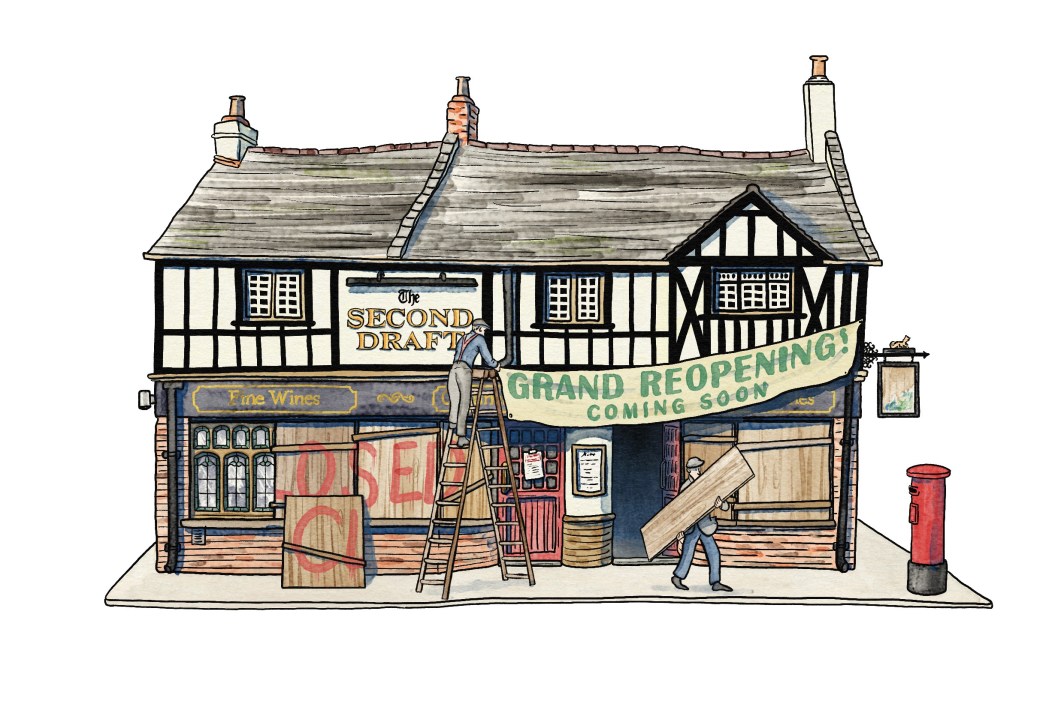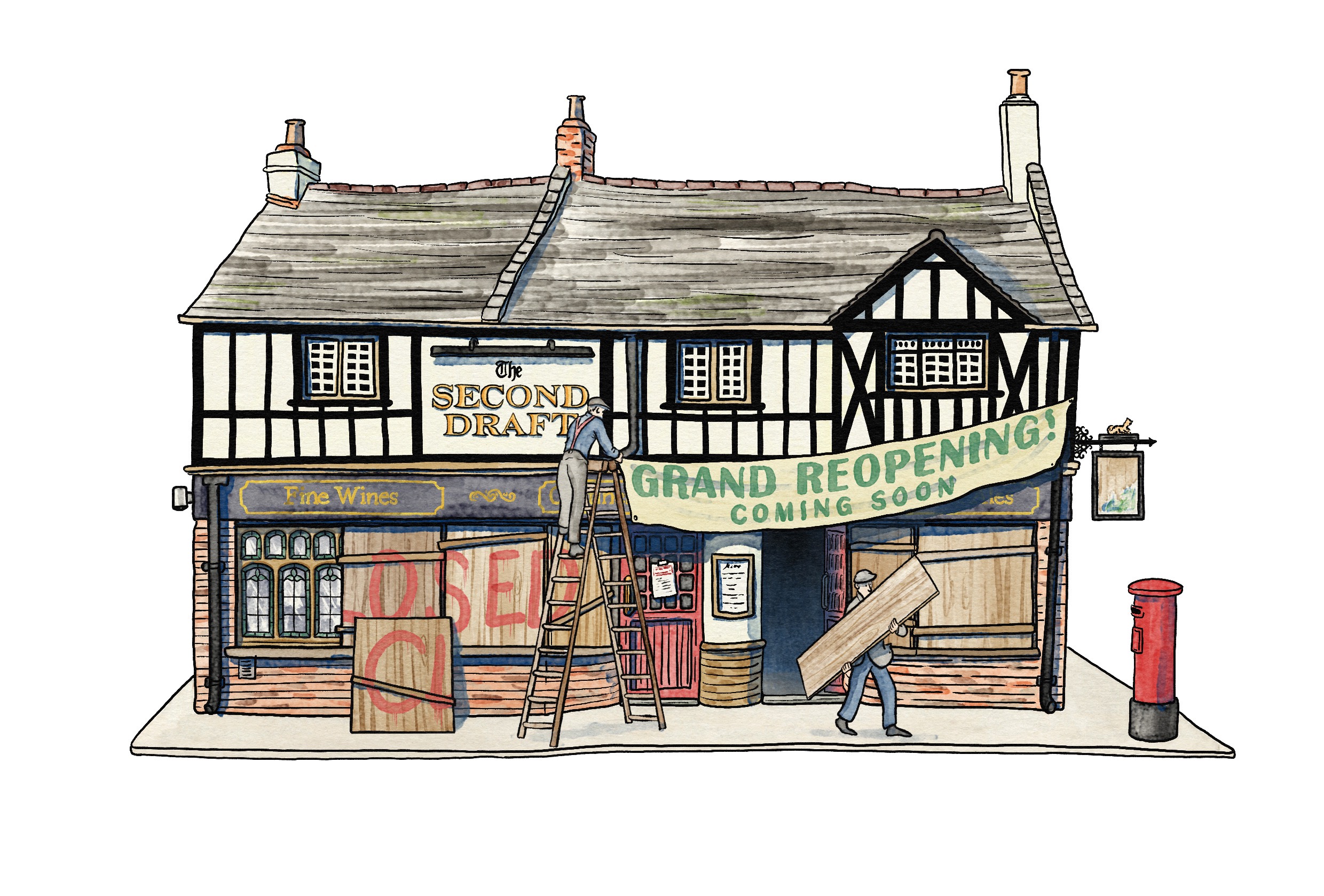The mood music around pubs lately has felt as if it were being played by the band on RMS Titanic while the industry goes down with the loss of all hands. Even before the body blow of the pandemic, people were generally drinking less, and more of what they did drink was from supermarkets. Then the spike in energy costs was particularly grave for publicans, who need to heat large rooms for 12 hours a day. Most recently, in the last Budget, they faced a hike in employer national insurance contributions, a parallel minimum wage rise and cuts in business rates discounts – with all of this offset by an insulting single ‘penny off a pint’ reduction in draught beer duty.
The crisis in the sector has been documented by The Spectator in alarming pieces by Rory Hanrahan, Gavin Mortimer and also by me, when I lamented the closure of my local after 300 years. Since I wrote that piece, in March, an estimated 95 more pubs nationally have gone forever, with 79 converted into housing, restaurants or shops, and a further 16 demolished outright, according to campaign group Camra. Many more – something like 500 – have ‘temporarily closed’.
Pubs these days are worth much, much more as vacant properties that can be developed rather than ongoing business concerns. That means that those in ‘temporarily closed’ limbo will typically see their owners applying for permission to convert them into more lucrative housing while – one must hope – regulars and locals fight to stop them on the basis of their value to the community. More communities will fail than succeed.
But look closely and you’ll find a more positive counter to this depressing trend: what I think of as ‘Lazarus pubs’ – those which come back from the dead, sometimes after many years. This can be the result of heroic efforts by locals and regulars – or simply down to finding someone brave and bold enough to take them on again.
I started reflecting on all this recently after we went for a walk in Darling Buds of May country, around the ridiculously pretty village of Pluckley in Kent. On our previous visit, five years ago, the village’s centrepiece, the Black Horse, was boarded up. So we were delighted on our return to find it had reopened. Its attractions were many: a scenic beer garden adjacent to the graveyard of a Norman church; one of the most spectacular inglenooks I have ever seen; locally produced rosé on sale alongside a range of good cask ales; free dog snacks in a jar on the bar. Pub perfection, in other words – and all the more pleasing because in 2020 its future had looked so grim.
Another Home Counties pub recently back from the grave is that local for opera singers, the Trevor Arms near Glyndebourne in East Sussex. It had been closed for eight years before finally reopening this summer. And it’s quite lovely once again.
Nearer to home, Heartwood Inns has taken on one of our locals, the Woodman in Southgate. It had been closed several times over the past 25 years, often for prolonged periods, but it’s a fine pub and it’s close to our hearts because my wife’s great-uncle was its landlord in the 1960s. We are hoping Heartwood will do the same kind of sensitive upgrade seen at the White Hart in Lewes, which now feels invigorated and lively again after years in the doldrums.
Another success story in the London suburbs has been Bohem Brewery, a micro-beer production company set up by two Czechs who unsurprisingly make lager in the craft style rather than the more usual ales. Having tested the waters with a small tap room in Bounds Green, they recently took on two long-mothballed pubs, the Nicholas Nickleby in Finsbury Park and the Queens Arms in Battersea, and are apparently making a success of both.
The Black Horse in Pluckley, Kent, is pub perfection – and all the more pleasing because on our previous visit, it was boarded up
Then there’s the Hand and Marigold in Bermondsey. It dates to 1793 but, like many others, closed during the pandemic. New owners have renovated it and it reopened this spring – to local delight. And amid the fanfare around the most talked about pub opening of recent times, the Devonshire on Denman Street in Soho, it’s easy to miss the fact that it too is a Lazarus pub. ‘The Dev’ was a boozer for a century or so before being converted into a Jamie’s Italian and then a high-end burger bar, before finally being turned back into a pub (with acclaimed upstairs restaurant) two years ago.
There’s also the case of the Black Cap in Camden. Its death was so well established that it was included in the book London’s Lost Pubs this year. ‘A pub called the Black Cap had been in Camden since the 1750s,’ wrote author Sam Cullen, adding that it had become ‘a landmark pub on the London drag scene… until the early 2010s when owners Faucet Inns (a name I’m sure the performers here would have had fun with) revealed plans to redevelop’. It transpires that those plans have thankfully never been realised, and after more than a decade boarded up, the pub seems to have been saved – it is reportedly reopening late this year.
There are many, many more pubs coming back to life than those I have had space to mention here. And such reversals give me hope that there is a future for the industry after all. In his classic pub book Back to the Local (1949), Maurice Gorham lamented the many London pubs lost to the Blitz: ‘The list of losses is too long to recite [but] happily, things were often not so bad as they first seemed. Almost every pub that still has four walls standing is now in business again. And there are enough brewers’ signs standing on razed sites to encourage the hope that some of these phoenixes will yet rise again.’
The economics of the past two decades has killed off even more pubs than the Luftwaffe managed but, like Gorham, we can only hope more will return, whether we call them Lazarus pubs or phoenixes. Those being revived may be in the dozens compared with the hundreds closing, but they still merit celebration – perhaps more so because they are so outnumbered by pub sector doom.
I took the idea of ‘Lazarus’ from the New Testament, of course. And the gospels, I think, also offer another relevant lesson here: in the parable of the lost sheep, Jesus teaches that God, like a shepherd, will leave 99 sheep to search for one that is lost, and then rejoice more over its return than over the 99 that didn’t stray. And so should it be with pubs: let us rejoice over each individual boozer that comes back to life, ideally by visiting it and buying a pint.
The pub sector has 99 problems but the Black Horse ain’t one – at least not any longer. And I’m happy to drink to that.








Comments